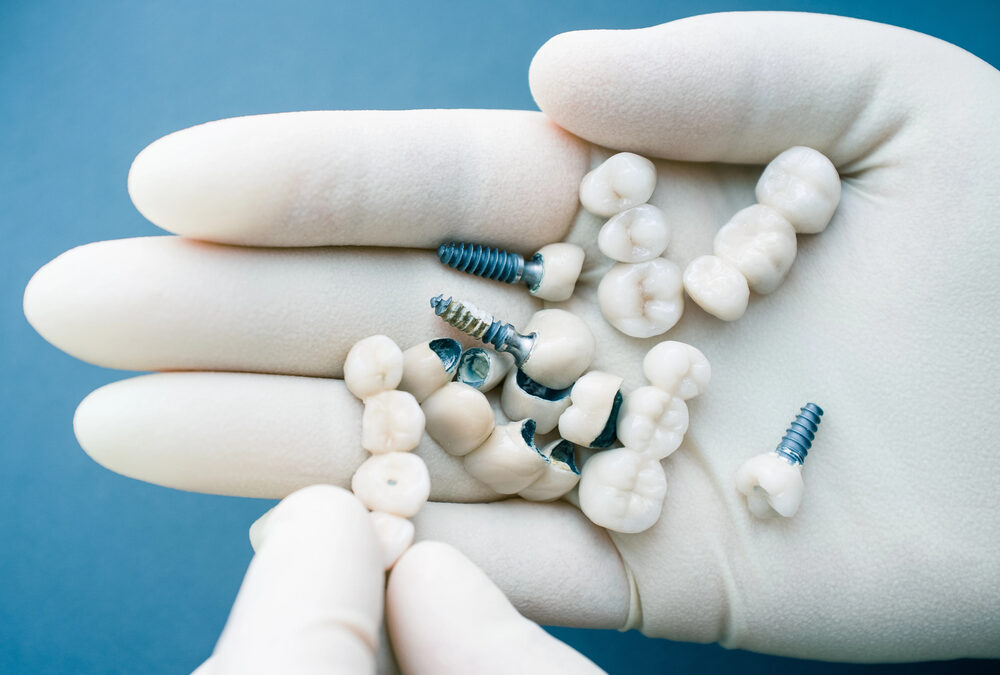Choosing the right dental prosthesis can significantly impact your quality of life. Two of the most common options for replacing missing teeth are dental implants and dentures. Both have their benefits and drawbacks, and the best choice depends on your specific needs, preferences, and oral health. This article will explore the differences between dental implants and dentures, helping you make an informed decision.
A dental prosthesis refers to an artificial device used to replace missing teeth or restore dental structures. These prostheses play a crucial role in improving oral function, aesthetics, and overall quality of life for individuals who have lost teeth due to decay, gum disease, injury, or other reasons. There are different types of dental prosthesis, including dental implants, dentures, and bridges, each offering unique benefits and considerations depending on the patient’s oral health and preferences. Dental prosthesis are custom-designed to fit comfortably and securely within the mouth, allowing patients to chew, speak, and smile with confidence. Regular care and maintenance, along with professional dental check-ups, are essential to ensure the longevity and effectiveness of these prosthetic devices.
Understanding Dental Implants
Dental implants are a popular and effective long-term solution for people who suffer from missing teeth, failing teeth, or chronic dental problems. A dental implant is a titanium post that is surgically placed into the jawbone beneath the gum line. This post acts as a tooth root and allows the dentist to mount replacement teeth or bridges into that area.
Benefits of Dental Implants
1. Natural Appearance and Comfort: Dental implants look and feel like your own teeth. Because they are designed to fuse with bone, they become permanent.
2. Durability: Implants are very durable and will last many years. With good care, many implants last a lifetime.
3. Improved Oral Health: Dental implants don’t require reducing other teeth, as a tooth-supported bridge does. Because nearby teeth are not altered to support the implant, more of your own teeth are left intact, improving long-term oral health.
4. Convenience: Implants eliminate the inconvenience of removing dentures, as well as the need for messy adhesives to keep them in place.
5. Bone Health: Dental implants help stimulate and maintain jawbone health, preventing bone loss and preserving the facial structure.
Drawbacks of Dental Implants
1. Cost: Dental implants can be more expensive than other tooth replacement options.
2. Surgical Procedure: The implant procedure involves surgery, which carries risks such as infection, injury to other teeth, or nerve damage.
3. Time: The dental implant process can take several months from start to finish, requiring multiple visits to the dentist.
Understanding Dentures
Dentures are removable appliances that can replace missing teeth and help restore your smile. If you’ve lost all or some of your natural teeth due to decay, gum disease, or injury, replacing missing teeth will benefit your appearance and your health.
Types of Dentures
1. Complete Dentures: These are used when all the teeth are missing.
2. Partial Dentures: These are used when some natural teeth remain. A partial denture usually consists of replacement teeth attached to a pink or gum-colored plastic base, which is sometimes connected by metal framework that holds the denture in place in the mouth.
Benefits of Dentures
1. Cost-Effective: Dentures are generally less expensive than dental implants.
2. Non-Invasive: Dentures do not require surgery and can be fitted more quickly than implants.
3. Versatility: Dentures can be a good solution for people with weak or unhealthy jaws or gums.
Drawbacks of Dentures
1. Discomfort and Inconvenience: Dentures can be uncomfortable and may require time to get used to. They can slip out of place while eating or speaking.
2. Maintenance: Dentures require daily removal and cleaning. They also need to be soaked overnight.
3. Bone Loss: Dentures do not prevent the jawbone from deteriorating, which can lead to changes in your facial structure over time.
4. Replacement and Repairs: Dentures may need to be adjusted, repaired, or replaced over time due to normal wear.
Making the Right Choice
When deciding between dental implants and dentures, consider the following factors:
1. Oral Health: If you have a healthy jawbone and gums, dental implants might be the better option. Implants require a sufficient amount of bone to support them.
2. Budget: Dentures are typically more affordable upfront, while dental implants can be a more significant investment. However, implants may provide better value in the long run due to their durability.
3. Convenience: If you prefer a permanent solution that feels and functions like natural teeth, dental implants are preferable. If you are looking for a non-invasive option, dentures might be suitable.
4. Maintenance: Implants require less daily maintenance compared to dentures, which need to be removed and cleaned regularly.
Additional Considerations: The Dangers of Mouthwash
While considering your options for dental prosthesis, it’s important to be aware of oral hygiene products like mouthwash. Although mouthwash can be beneficial for freshening breath and reducing plaque, some products contain alcohol or other harsh chemicals that can irritate the mouth and gums, potentially exacerbating issues for denture wearers or those with dental implants.
Overuse of mouthwash, especially those with alcohol, can dry out the mouth, alter the balance of bacteria, and contribute to oral health problems. For individuals with dental prostheses, choosing alcohol-free mouthwash and consulting with a dentist about the best products to use can help mitigate these risks.
Both dental implants and dentures offer solutions for missing teeth, each with its advantages and disadvantages. Dental implants provide a more permanent and natural-looking solution, while dentures offer a non-invasive and cost-effective alternative. Your oral health, budget, and personal preferences will play a crucial role in determining the best option for you. Always consult with your dentist to evaluate your specific situation and make an informed decision that will benefit your long-term oral health and overall well-being.



